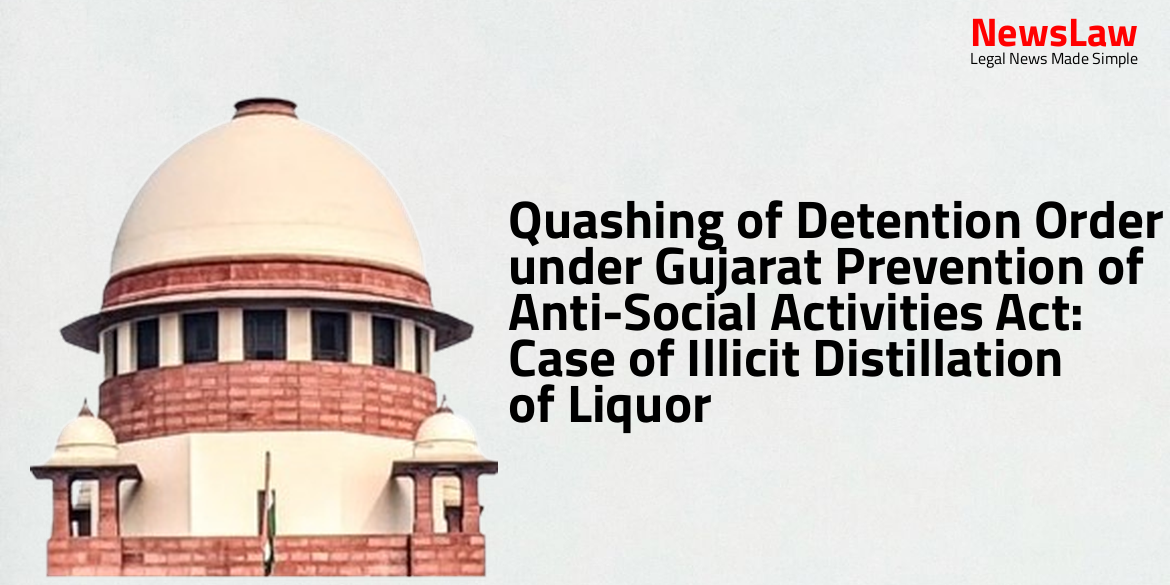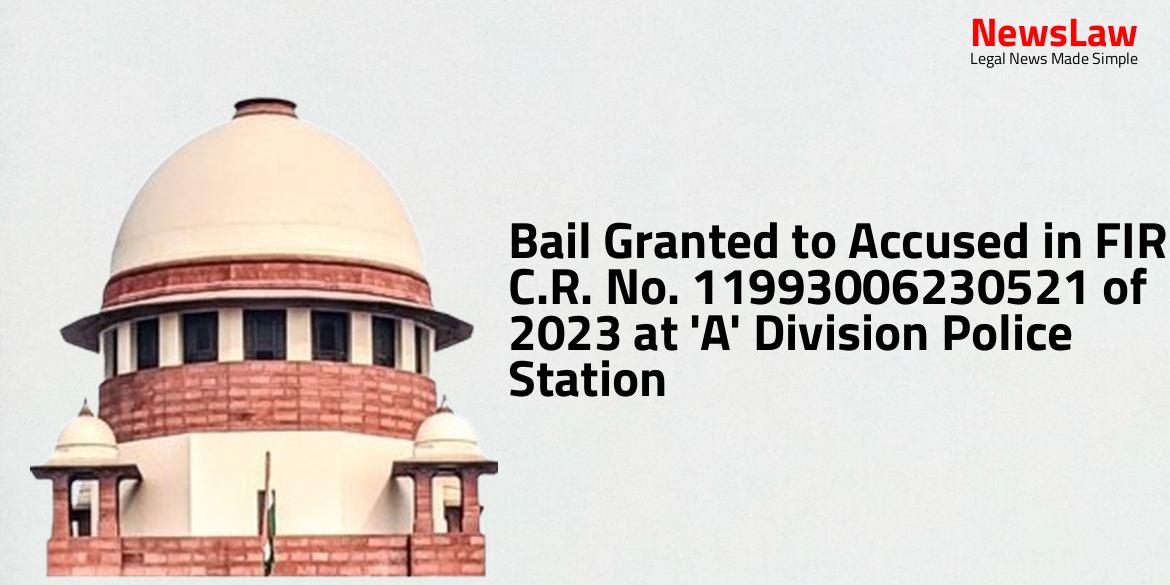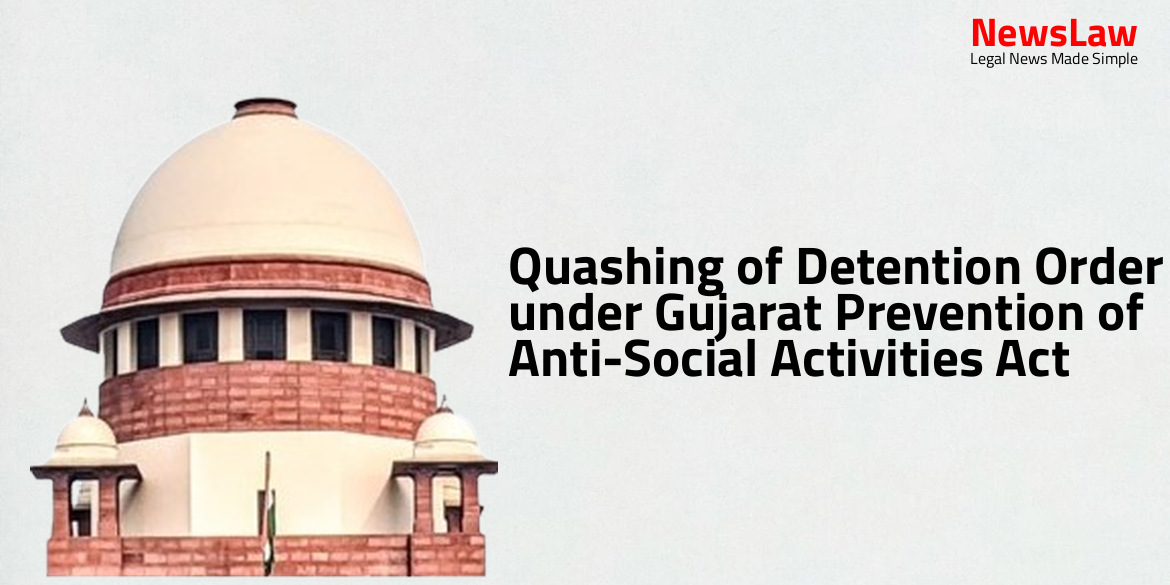In a significant legal development, the Gujarat High Court has set aside a detention order under the Gujarat Prevention of Anti-Social Activities Act related to the illicit distillation of liquor. The judgment underscores the importance of upholding personal liberties and ensuring that preventive detention laws are invoked only in cases with a direct impact on public order. The case sheds light on the need for a cautious approach in exercising exceptional powers of preventive detention, emphasizing the balance between security concerns and individual freedoms.
Facts
- The present petition challenges the order of detention dated 23.12.2023 passed by the detaining authority under the Gujarat Prevention of Anti-Social Activities Act, 1985.
- The detaining authority has detained the petitioner under Section 3(1) of the Act.
- The petitioner is defined as a detenue under Section 2(c) of the Act.
Arguments
- The advocate for the petitioner – detenue argues that the detention order should be quashed as it is solely based on the registration of four FIRs, which do not bring the case within the definition under Section 2(c) of the Act.
- It is contended that the alleged illegal activities do not have a nexus with public order but rather constitute a breach of law and order.
- Apart from witness statements and FIR registration, no other substantial evidence on record shows that the detenue’s actions fall under breach of public order.
- The advocate argues that the criminal cases involving the detenue have not disturbed the social fabric to an extent that threatens the existence of normal life or disrupts public order.
- It is highlighted that the detenue is out on bail for all offenses, suggesting a lack of immediate threat or necessity for detention.
- The detaining authority is criticized for not considering the detenue’s bail status and for not sufficiently evaluating the impact of the alleged activities on public order.
- The detaining authority’s subjective satisfaction is found to be illegal and not in accordance with the law.
- The offences alleged in the FIRs do not impact public order as required under the Act.
- Other relevant penal laws are sufficient to address the situation.
- The allegations against the petitioner (detenue) are not relevant for invoking Section 2(c) of the Act.
Analysis
- The offences alleged do attract punishment under the Andhra Pradesh Prohibition Act, but preventive detention laws should not be used for such cases.
- There is no evidence showing the detenue as a threat to public order, besides the general statements.
- The order did not mention any bail cancellation application by State authorities.
- Preventive detention should not be a substitute for ordinary law or investigative functions of authorities.
- Preventive detention is meant to prevent certain offences without trial, but cannot be used as perpetual custody without trial.
- Powers of preventive detention are exceptional and draconian.
- The case shows non-application of mind by the detaining authority to relevant circumstances.
- The two FIRs against the detenu could be managed through normal criminal law procedures.
- Preventive detention has roots in colonial era continued with constitutional safeguards against abuse.
- The detention order was passed for detenu involved in illicit distillation of liquor, with the State arguing that ordinary law would be ineffective in preventing such activities.
- The personal liberty of an accused should not be compromised for preventive detention based solely on criminal implication.
- The distinction between disturbance of ‘law and order’ and ‘public order’ should be clearly understood before invoking Preventive Detention Act.
- The power of the State to curb rights under criminal and preventive detention laws should be exercised cautiously and based on a genuine threat to public order or security.
- Every breach of peace does not lead to public disorder; only serious incidents affecting the community or public interest fall under the scope of preventive detention.
- The freedom of individuals should not be restricted unless extremely necessary and their activities directly impact ‘public order’.
- The routine and unjustified use of Preventive Detention Law in Telangana has been noted, leading to multiple detention orders being quashed by the courts.
- Detention orders should be evaluated against lawful standards to ensure fairness and prevent misuse of exceptional preventive detention powers.
- The personal liberty protected under Article 21 is of utmost importance and must be meticulously followed by the detaining authority.
- Article 22 should be seen as an exception to Article 21 and can only be applied in rare and exceptional cases.
Decision
- Direct service permitted.
- Rule made absolute to allow the petition.
- Simplicitor registration of FIRs alone does not relate to breach of public order.
- No relevant material to invoke power under Section 3(1) of the Act.
- Present petition allowed, impugned order of detention quashed and set aside.
- Detenue ordered to be set at liberty forthwith.
Case Title: RAHUL JAGDISHBHAI SHANTILAL MAJIRANA (BHIL) THRO SANTOKBEN JAGDISHBHAI MAJIRANA Vs. STATE OF GUJARAT
Case Number: R/SCA/1154/2024



